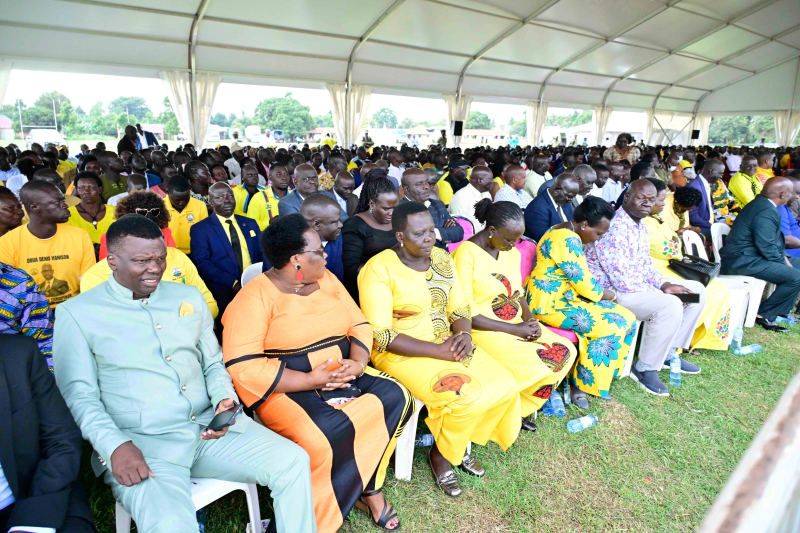LIRA CITY, August 18, 2025 – Leaders from the Lango Sub-region have called on government to adopt the Parish Development Model [PDM] as a framework for delivering war compensation to affected communities. They argue this would help eliminate widespread corruption in the current payout process.
Speaking during a meeting with President Yoweri Museveni at Lango College Playground in Lira City over the weekend, political, religious, and cultural leaders highlighted the failure of the current compensation mechanism. Locals lost their cattle and property during the protracted conflict in northern Uganda between 1986 and 2006.
The leaders believe that the PDM, which involves thorough community vetting of beneficiaries, would ensure transparency and accountability, unlike the current system where funds are allegedly diverted by intermediaries and corrupt officials.
“The money is not reaching the intended beneficiaries,” said Lillian Eyal, the Resident District Commissioner [RDC] of Lira. “We have leaders who manipulate the process and walk away with millions. When compensation arrives, they escort the locals to the bank, help them withdraw the money, and leave them with as little as Shs 50,000 from Shs 5 million payment.”
Eyal called for a complete overhaul of the current compensation method.
“The system we’re using now is not working. We urge the government to reorganise and find better strategies so that those who truly lost their cattle receive the benefits directly,” she added.
The government has so far relied on a court-approved list of war victims for compensation. In 2010, the Lango War Claimants Association filed Civil Suit No. 027/2010 at the Lira High Court seeking restitution for livestock and property lost during the conflict.
Susan Abeja, Woman Member of Parliament for Otuke district, confirmed that corruption has deeply infiltrated the compensation process. She said some culprits have already been apprehended.
“I can confirm the theft is real. Three prominent individuals are currently in jail, including the former NRM Chair for Otuke and a businessman. They exploited poor men and women,” Abeja stated. “I support household compensation, but there must be continuous arrests of these thieves.”
Babrah Aketch, RDC of Dokolo district, echoed the call to transition to the PDM. “We’ve arrested people who were soliciting money from the community. If we switch to the PDM approach, we’ll know exactly who the beneficiaries are and where the funds are going,” Aketch said.
Christopher Odwe, Deputy Speaker of Dokolo district, added that the PDM’s proven track record makes it a reliable solution.
“The PDM has worked well in Uganda. The system is now stable. Let’s use it to ensure that compensation reaches every family. Many of the poor are being left behind,” Odwe said.
Julius Achon Bua, Member of Parliament for Otuke East Constituency, proposed that each household receive five animals, two bulls, two cows, plus an additional one million shillings to purchase an ox-plough and seedlings to promote agricultural productivity.
“In Lango, hiring an ox-plough to till an acre costs Shs 100,000. Tractors are unaffordable for the majority. Only about 1 percent of the population can access them. This household-based compensation will improve income faster,” Achon explained.
In response, Museveni acknowledged the flaws in the current system and praised the strengths of the PDM.
“The PDM works because it is grassroots-based. We tried NAADS and other programmes, but they didn’t work. Even when I used the army, whom I trusted, they ended up allocating resources to themselves. That is why we brought the system down to the parish level,” Museveni said.
He admitted he had heard reports of corruption in cattle compensation, including from the Teso Subregion, and agreed that a new approach was needed.
“I think the best way forward is for you to select a trusted group of representatives. I will meet with them in Kampala to discuss how we can resolve this compensation issue effectively,” Museveni advised.
As the government considers new measures, Lango leaders continue to push for a transparent, community-based system to ensure that war victims finally receive the justice and support they were promised.
Buy your copy of thecooperator magazine from one of our country-wide vending points or an e-copy on emag.thecooperator.news
